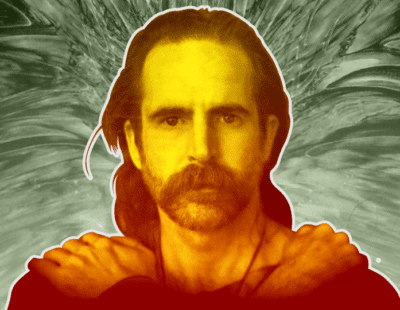
Some years back, I elected to undergo a hypnosis session designed to thresh and to winnow away the subject’s ‘epidermal’ identity from their higher self. Remarkably, it didn’t sound remotely threatening to me at the time, (it absolutely should have!) I was in an especially exploratory phase of my life and plus I had serious doubts that I was even suggestible enough to be influenced by a hypnotherapist in the first place. I knew who the fuck I was, right? Suffice it to say, like Jorge Masdival in a sensible pantsuit, my therapist was able to drop me like a sack of un-hulled grain, with no gentle hypnogogic passageway to bridge my supraliminal thoughts to those mysterious mendulla oblan-grottos of the psyche’s underworld. (Though—if it’ll please the court—I’ll cop to having smoked a skosh of something beforehand.) Regardless, I turned out to be as mutable as off-brand sandwich-wrap and in the blink of an eye, I was out, kid. Gone.
I remember being guided by my therapist’s voice down a winding corridor. There was nothing visible but a needle of candlelight as she led me through a sequence of receiving rooms for different elements of the self. As I recall it, personal preferences were the first thing to be tossed down, like a shoulder bag after a long day. How to describe the feeling of that initial cognitive or—perhaps spiritual—unsaddling? In all honesty, I don’t know and I shan’t try to other than to say that it’s something fucking else, Chief. In another chamber, I was instructed to discard my most recent memories, and in another one to leave behind all those more deep-seated ones, the treasured, the traumatic and the mundane. It almost felt mechanical; all those innumerable files were simply ejected and subtracted from the balance of my identity. Further on there was another place to shimmy out from those associations with physical stimuli and then another for the impressions left by the emotional ones. No more attraction to sex, no more blooms of compassion, no craving for acceptance of any sort. My feet were hardly touching the ground by this point.
I’d thus far been too enthralled by the exercise to be distracted with concerns about getting all my ‘stuff’ back once the ride was over, however, when she suddenly snuffed the candle’s flame—my sole point of orientation—and told me to discard my name onto the floor in the dark, the margins of my resolve were instantly revealed, met and overwhelmed. Discard my name and then just follow you on, like a vaguely cognizant smudge into the reaches of some immeasurable, innominate void? Ach du Scheiße, lady, no fucking way! Every jot of ego I’d dispossessed hurtled back into its former station like Iron Man’s suit upon summoning and I was instantly in flight mode; almost immediately blinking back at her in shock from the corner of her aggressively unergonomic, roll-arm sofa, with all my personal baggage accounted for and intact.
In reference to the Apollo 11 mission, Buzz Aldrin famously quipped, “…returning to Earth, that was the challenging part.” For whatever it’s worth, I found no such trouble fumbling back to terra-firma as I knew it. Some of us are (cosmo) nautical by nature, I my friend am certainly not.
A ship in harbor is safe, but that is not what ships are built for. —J. A. Shedd.
All civilizations become either spacefaring or extinct. – Carl Sagan
WELTSCHMERZ
Like that hypnotherapy session, Saarbrüken, Germany’s Gemini One are a band designed to nip at the lacework yoking a body to their jejune interpretation of who they are and what they’re capable of. Formed initially as a solo project in 2009 by Mathias Rudolph, the sound of Gemini One’s initial propulsion settled somewhere between an aboriginal Godflesh, a wall-eyed Slint on ‘round-the-clock ‘preventive monitoring,’ and a knuckle-scraping Yob. The band appeared predicated as something of a negative vector operating beside a positive one, with wintry, rust-eaten doom behaving as the magnitude on the one side and a peculiar fascination with America’s early space program functioning as its counterpoint. Longstanding bassist Tobias Schmitt joined in time for the recording of Gemini One’s absolutely hostile debut EP, (which the band would opt to re-record in 2012.) It’s worth mentioning that Tobias would depart shortly after that re-recording only to re-materialize in January of this year to contribute his bass-work to the duo’s Per Aspera effort, a slight but marvelous remark of outsider-doom jointly conceptualized more than half a decade prior. This left Gemini One as something of a bodiless entity, (almost entirely notional,) for years within the mind of its’ founding member.
“[Initially] we just wanted to make something slow and heavy; something pure. And raw; not too clean, you know?” says Mathias. “Most bands nowadays try to record everything in the studio with too much processing. I just wanted something that reflects every bit that I feel… “
Determining exactly how either Mathias or ‘Toby’ ‘feel’ proves more easily accomplished by reverse—engineering the impressions checker-boarding their compositions as opposed to eking the answer out by way of drab ol’ conversation. Don’t misunderstand me; both gentlemen are more than courteous enough. They’re also decisively elusive and taciturn and—in truth—Gemini One’s note of impermeable mystery is appreciated. The fact that they operate as an instrumental band only tends to flatter their enigmatic quality in addition to stressing a kind of heavy-hearted remoteness that paces ‘round the core of their anatomy. Given that NASA’s Gemini One was an unmanned flight, it makes for a fitting correspondence. But there’s also a fascinating paradox embedded in the autonym’s separate halves.
“I cannot deny that, when I started the band as a project on my own, ‘gemini,’ (which is Latin for twin,) combined with the number ‘one’ made me think about the [relationship between] the two words a lot,” affirms Mathias. “It’s like you’re one part of something and the other half is somewhere else. …In my entire life I’ve never felt complete and I still don’t. As if there was or is something missing. The music we create in Gemini One pretty much reflects that feeling, with all its melancholy. We as human beings are put in this place called Earth against our will. People intelligent enough to grasp their existence experience most parts of their lives as completely random.”
Though this happens to represent a belief structure that’s almost a reverse-negative of my own at present, it is one that I maintain a certain sympathy for. The righteous clamor of Gemini One as they defy our lower atmosphere’s slipstream claws out a vibration that’s familiar to me, like navigating a sepia-colored neighborhood from your adolescence. It’s a structure that I entirely resonated with before discovering dharma and I appreciate its sorrowful logic.
The Universe, so far as we can observe it, is a wonderful and immense engine; its extent, its order, its beauty, its cruelty, makes it alike impressive. —George Santayana
That elemental throb of un-attachment has erupted into a rolling-boil over their subsequent efforts—most especially their upcoming EP, Per Aspera, though always affected with a welcome appreciation for economy of motion.
“Many doom bands write very drawn-out songs, solely to [protract them] and it becomes exhausting over a sixty or seventy minute album,” insists Tobias.
“I don’t like repetition very much,” Mathias chimes in, “it just bores me. For some music it’s fine but I hate to repeat riffs over and over again. And personally, I want to enjoy listening to [Gemini One] myself and not get bored.”
Caught somewhere between the dusty solemnity of Red Sparowes, the aloof metropolitanism of Pornography era The Cure, and the dormant volatility of a narcotized Shellac, Per Aspera gorgeously illustrates the isolated trajectory of a satellite fettered to its distant orbit. In a bizarre twist of chronology, Per Aspera was actually composed directly after the self-titled debut, despite the fact that the meditative and vaguely proggy, (think PinkFloyd’s Meddle) Float/Levitate single was released before it.
“Float/Levitate was more like an experiment. I lost myself in that session; I thought of it just as a state of being. It’s how I currently feel in my life: floating… The whole thing came out of my head without a filter. It was written and recorded in two days. But before I even started writing [the single] we already had those four songs for the Per Aspera album. We just didn’t manage to record them. That was in 2012. Anyway,” he continues, “just this year I re-recorded the guitars and sent Tobias a link, asking if he’d like to continue working together with me on the EP…”
THE DISTINCTION BETWEEN HYPERBOLE AND HYPERBOLA
2009 was perhaps the most fitting year for the launch of Gemini One’s cosmologically-minded doom sermons as it happened to mark the fortieth anniversary of NASA’s Apollo 11 mission, an objective pocked with hazards including an overloaded, glitchy lunar module, lengthy spells of bone-chilling radio silence and the equivalent of a ‘low fuel light’ flashing on the Command and Service Module’s dash, signaling 60 seconds to a mission abort while operating at an altitude that made aborting all but an impossibility. This sort of nail-biting, interstellar swashbuckling is part and parcel of the band’s attraction to the technicolored uncertainty of germinal space exploration.
“Yes, it’s the uncertainty that [captivates] me,” agrees Mathias. “You don’t know what is waiting out there…”
“Definitely,” adds Tobias. “It’s the calculating, scientific approach. It’s about the problems people solve and how far we’ve come in space travel over the last sixty years. And also, the fact that there are human beings risking their lives simply to prove that science can take us anywhere. That’s one of the reasons that the first song [on Per Aspera] is called ‘CVll,’ (the Columbia shuttle’s flight number.) Those people sacrificed their lives.”
Whether or not “CVll” is intended as any sort of functional encomium is mere frill as the sample at the track’s end settles over the listener. “It’s basically Houston’s last communication with the Columbia mission which exploded during reentry,” offers Tobias. The impact’s chilling.
“We named the new album Per Aspera because it has a generally darker tone but with the sky ‘opening up’ at the end on [the final track] ‘Ad Astra,’” says Mathias. “Overall, the theme is ’Per Aspera ad Astra,’ [roughly translated as ‘through suffering to the stars.’] It describes the way we see space exploration and science and people going through hardships and dying simply to push humanity further. We’re only writing what we feel,” he concludes. “Like any musician, (I would assume,) we’re trying to express our feelings and our emotions through our music.”
Smelling the barn yet, my space-sick, (yeah, that’s a thing,) Oneironauts? Then we’ll leave it be roughly here. Thank you kindly, Gemini One for your participation, your patience and most importantly for your demurely brilliant dispatches; you’ve provided a much needed harmonic companion throughout the crafting of several Fallow Heart pieces to date.
Oh, by the way, that John Augustus Shedd quote I insinuated above has frequently been cited as a call to pursue one’s innate desire for adventure; shuttering that nagging hiss of rationality in favor of personal liberation, come hell, come mononucleosis, come any and all in between. Though that interpretation certainly works, an even simpler one may be the more applicable.
A ship left in harbor is safe from storms and from collisions and from misdirection but it will, in time rust and founder, ladies and gentlemen. And it’ll do so having never made acquaintance with the true begetter of its most intimate fears. It’ll be broken apart by hammer or by time regardless of its meticulously curated ignorance and decorum. Flotsam also treads water. Is that really all that a ship is meant for: to remain cymbiform and bob along or does it have—nestled amongst its ballast—some greater purpose?
Astronomy compels the soul to look upward, and leads us from this world to another. —Plato
The space shuttle is by far the most complex machine in the world… And inside that vehicle are seven astronauts, each one of which is more complex than this vehicle we went up in… —Rick Husband, American Astronaut/Challenger Space Shuttle crew member





